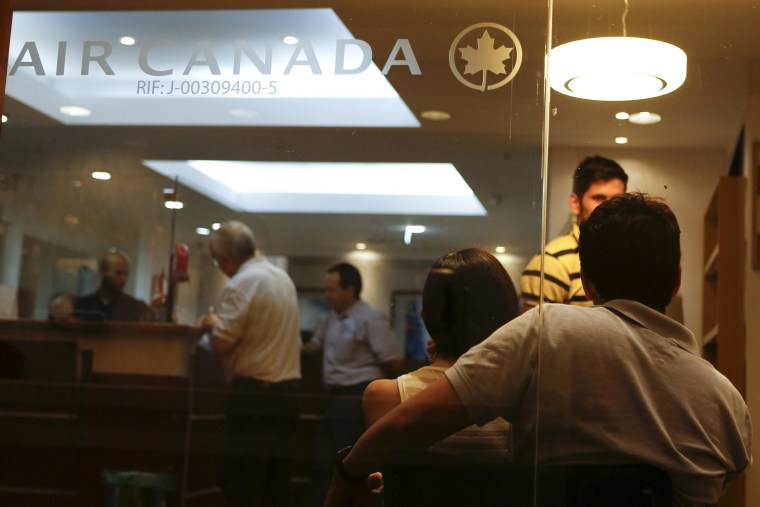MIAMI – Flying in and out of Venezuela is about to get tougher. Citing concerns about growing violence and the more than $3 billion airlines say they are owed by the Venezuelan government, many carriers are cutting back flights to the South American country. Some have stopped flying there all together.
Air Canada suspended flights this week until further notice amid clashes between anti-government protesters and security forces over crime, human rights violations and food shortages that have left more than 29 dead. The airline issued a statement saying it could “no longer ensure the safety of its operation.”
Air Canada's last flight between Caracas and Toronto left Sunday. It's offering refunds to anyone holding tickets.
Venezuelan Congressman Carlos Farias, a President Nicolas Maduro supporter, called the airline’s decision politically-motivated.
“Canada’s political view opposes Venezuela and Air Canada follows that view,” Farias said.
Flights between Venezuela and neighboring Colombia, a frequent route for business travelers in the region, have also been cut by about 70 percent. Avianca, the third largest foreign carrier servicing Venezuela, has reduced its daily flights between Bogota and Caracas from three trips a day to one.
"An airline that leaves the country will not return while we are in power, they will have to overthrow us."
In May, the airline will eliminate all flights between Bogota and the city of Valencia, the site of deadly protests against Maduro. Avianca said it has made adjustments in some routes, but that Venezuela remains "a very important market."
More than a dozen airlines have scaled back travel to Venezuela over the last year. Maduro's foreign transaction policies are mostly to blame, according to industry experts.
The International Air Transport Association, IATA, says his administration owes $3.7 billion in ticket revenue to international airlines.
In Venezuela the government acts as a broker in all foreign business dealings. Travelers pay for tickets locally in the national currency, the bolivar, and airlines exchange bolivars for dollars with the approval of a government agency, the Commission for the Administration of Currency Exchange.
Delays at that agency have caused some airlines to not be able to trade bolivares for dollars since 2012, which means they are stuck with a currency that keeps losing value and is not accepted by international creditors.
“It is unacceptable that the Venezuelan government is not playing by the rules set out in treaties it has signed,” said Geneva-based IATA director Tony Tyler in a statement. “Airlines certainly cannot sustain operations indefinitely if they can’t get paid,” he said.
Tyler labeled the months of negotiations with the Venezuelan government to get the issue resolved as “unsuccessful.”
The Venezuelan Airlines Association has written a letter to the country's transportation minister asking that payment be made to the carriers or local airline and airport jobs will be lost.
President Maduro, a former bus driver and political heir to late President Hugo Chavez, says airlines reducing service to his country will face "severe measures."
"An airline that leaves the country will not return while we are in power, they will have to overthrow us," Maduro said during a March 14 news conference to the carriers that stop flying to Venezuela.
Eric Olson, a Wilson Center Latin American expert, said Maduro sees the airlines’ actions as a personal affront.
“He runs the country like whoever doesn't agree with him is the enemy, betraying Venezuela and the revolution,” he said. “He takes things personally.”
Maduro backer Farias went as far as suggesting that airline ticket prices should be regulated by the government. After a meeting with representatives from several airlines including American Airlines, Avianca and Iberia, the congressman said he would discuss with the president a plan to effort price controls on tickets after following complaints from travelers that the carriers are charging too much.
“We are going to study the possibility of working on a law that can regulate airline services,” Farias said.
Frequent flyers see fewer options ahead for their trips to Venezuela. Oil and gas expert Daniel Guilarte Mantellini is based in Houston and says he's reduced his trips to his home country.
“As a Venezuelan, knowing the facts every business has to go through, to obtain the foreign currencies from the government, I am considering many of them will reduce their flights to a minimum,” Guilarte Mantellini said.
Many travelers are hoping American Airlines, which has 48 weekly flights between the U.S. and Venezuela continues to fly to the South American country.
“We have no changes to announce at this time," says American Airlines spokeswoman Monica Pantin. As to any possible flight reductions in the future, she said "we simply can't speculate."
